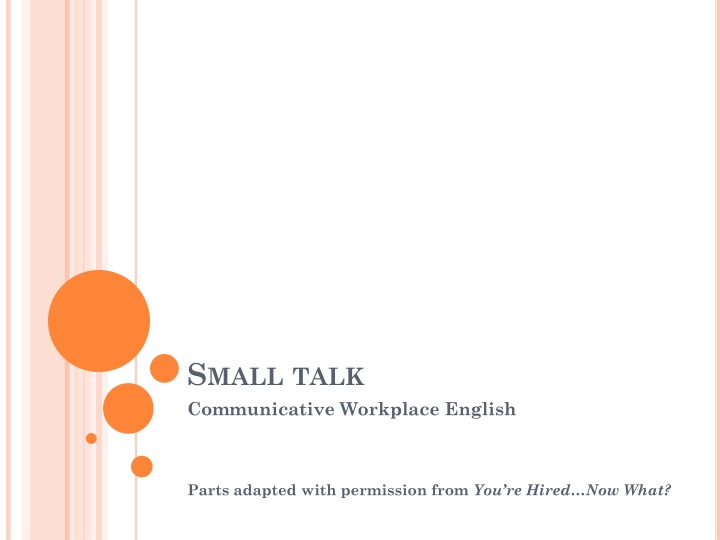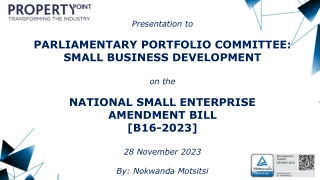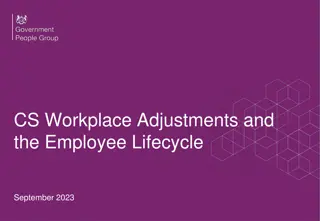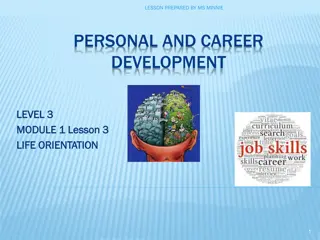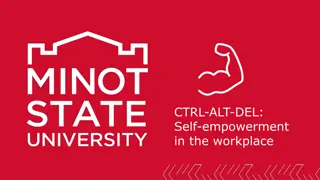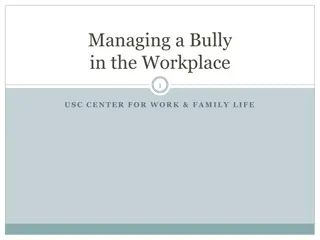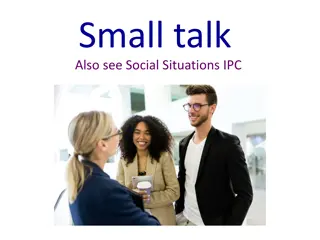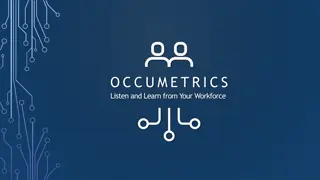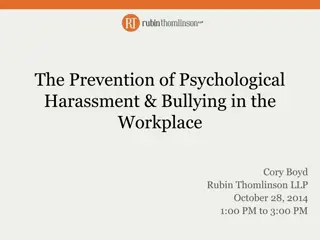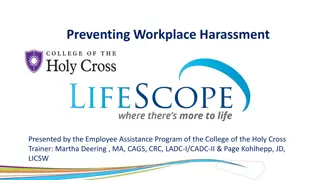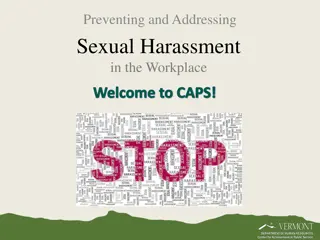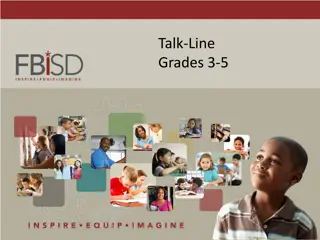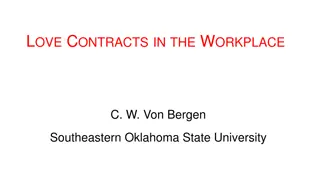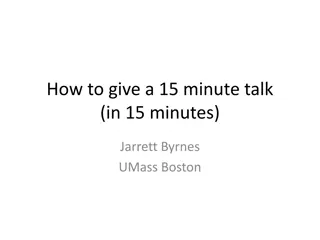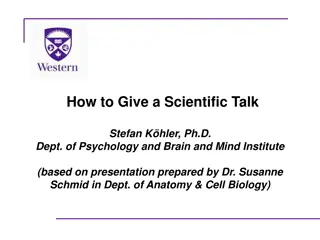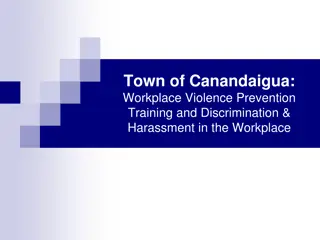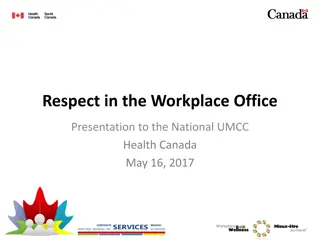Small Talk in the Workplace
Small talk in the workplace involves engaging in polite conversations about unimportant or non-personal topics. Common small talk topics include the weather, sports, work, news, family, and hobbies. It plays a crucial role in building rapport and fostering a positive environment among colleagues.
Uploaded on Sep 23, 2024 | 1 Views
Download Presentation

Please find below an Image/Link to download the presentation.
The content on the website is provided AS IS for your information and personal use only. It may not be sold, licensed, or shared on other websites without obtaining consent from the author.If you encounter any issues during the download, it is possible that the publisher has removed the file from their server.
You are allowed to download the files provided on this website for personal or commercial use, subject to the condition that they are used lawfully. All files are the property of their respective owners.
The content on the website is provided AS IS for your information and personal use only. It may not be sold, licensed, or shared on other websites without obtaining consent from the author.
E N D
Presentation Transcript
SMALL TALK Communicative Workplace English Parts adapted with permission from You re Hired Now What?
WHAT IS SMALL TALK? Small talk is polite conversation about unimportant or not overly personal topics
WHAT IS SMALL TALK? Small talk is polite conversation about unimportant or not overly personal topics Common small talks topics:
WHAT IS SMALL TALK? Small talk is polite conversation about unimportant or not overly personal topics Common small talks topics: The weather
WHAT IS SMALL TALK? Small talk is polite conversation about unimportant or not overly personal topics Common small talks topics: The weather Sports and entertainment
WHAT IS SMALL TALK? Small talk is polite conversation about unimportant or not overly personal topics Common small talks topics: The weather Sports and entertainment Work
WHAT IS SMALL TALK? Small talk is polite conversation about unimportant or not overly personal topics Common small talks topics: The weather Sports and entertainment Work The news
WHAT IS SMALL TALK? Small talk is polite conversation about unimportant or not overly personal topics Common small talks topics: The weather Sports and entertainment Work The news Family
WHAT IS SMALL TALK? Small talk is polite conversation about unimportant or not overly personal topics Common small talks topics: The weather Sports and entertainment Work The news Family Hobbies
WHAT IS SMALL TALK? Small talk is polite conversation about unimportant or not overly personal topics Common small talks topics: The weather Sports and entertainment Work The news Family Hobbies Travel
WHAT IS SMALL TALK? Small talk is polite conversation about unimportant or not overly personal topics Common small talks topics: The weather Sports and entertainment Work The news Family Hobbies Travel Hometown
WHAT IS SMALL TALK? Small talk is polite conversation about unimportant or not overly personal topics Common small talks topics: Small talk topics to avoid:
WHAT IS SMALL TALK? Small talk is polite conversation about unimportant or not overly personal topics Common small talks topics: Small talk topics to avoid: Religion
WHAT IS SMALL TALK? Small talk is polite conversation about unimportant or not overly personal topics Common small talks topics: Small talk topics to avoid: Religion Political views
WHAT IS SMALL TALK? Small talk is polite conversation about unimportant or not overly personal topics Common small talks topics: Small talk topics to avoid: Religion Political views Personal finances
WHAT IS SMALL TALK? Small talk is polite conversation about unimportant or not overly personal topics Common small talks topics: Small talk topics to avoid: Religion Political views Personal finances How much someone paid for something
WHAT IS SMALL TALK? Small talk is polite conversation about unimportant or not overly personal topics Common small talks topics: Small talk topics to avoid: Religion Political views Personal finances How much someone paid for something Sexual preferences
WHAT IS SMALL TALK? Small talk is polite conversation about unimportant or not overly personal topics Common small talks topics: Small talk topics to avoid: Religion Political views Personal finances How much someone paid for something Sexual preferences A person s size or weight
WHAT IS SMALL TALK? Small talk is polite conversation about unimportant or not overly personal topics Common small talks topics: Small talk topics to avoid: Religion Political views Personal finances How much someone paid for something Sexual preferences A person s size or weight A person s age
WHAT IS SMALL TALK? Small talk is polite conversation about unimportant or not overly personal topics Common small talks topics: Small talk topics to avoid: Jokes about women, races, ages, religions
WHAT IS SMALL TALK? Small talk is polite conversation about unimportant or not overly personal topics Common small talks topics: Small talk topics to avoid: Jokes about women, races, ages, religions Personal problems
WHAT IS SMALL TALK? Small talk is polite conversation about unimportant or not overly personal topics Common small talks topics: Small talk topics to avoid: Jokes about women, races, ages, religions Personal problems Health problems
WHAT IS SMALL TALK? Small talk is polite conversation about unimportant or not overly personal topics Common small talks topics: Small talk topics to avoid: Jokes about women, races, ages, religions Personal problems Health problems Why someone is single, doesn t have children, or when they plan to get married
WHAT IS SMALL TALK? Small talk is polite conversation about unimportant or not overly personal topics Common small talks topics: Small talk topics to avoid: Jokes about women, races, ages, religions Personal problems Health problems Why someone is single, doesn t have children, or when they plan to get married What s wrong? Why someone looks tired, stressed
PRACTICE Small talk often begins with a question: TAG QUESTIONS Beautiful day, isn t it? The weather is awful out there, isn t it? Yes, it is. Busy day at work, isn t it? Interesting meeting, wasn t it? The office party was great, ________? Mary s presentation went well, _______? _________ This new office space is small, _______? _________ You re from China, _________? Great game last night, _________? Yes, it is. _________ _________ _________ _________ _________
TAG QUESTIONS Begin with a statement, followed by a question:
TAG QUESTIONS Begin with a statement, followed by a question: It is a beautiful day, isn t it?
TAG QUESTIONS Begin with a statement, followed by a question: It is a beautiful day, isn t it? The party was fun, wasn t it?
TAG QUESTIONS Begin with a statement, followed by a question: It is a beautiful day, isn t it? The party was fun, wasn t it? The verb tense in the statement matches the question
TAG QUESTIONS Begin with a statement, followed by a question: It is a beautiful day, isn t it? The party was fun, wasn t it? The verb tense in the statement matches the question You went to the meeting, didn t you?
TAG QUESTIONS Begin with a statement, followed by a question: It is a beautiful day, isn t it? The party was fun, wasn t it? The verb tense in the statement matches the question You went to the meeting, didn t you? You will come to work tomorrow, won t you?
TAG QUESTIONS Begin with a statement, followed by a question: It is a beautiful day, isn t it? The party was fun, wasn t it? The verb tense in the statement matches the question You went to the meeting, didn t you? You will come to work tomorrow, won t you? You are new here, aren t you?
TAG QUESTIONS Begin with a statement, followed by a question: It is a beautiful day, isn t it? The party was fun, wasn t it? The verb tense in the statement matches the question If the statement is positive, the question is negative, if the statement is negative, the question is positive.
TAG QUESTIONS Begin with a statement, followed by a question: It is a beautiful day, isn t it? The party was fun, wasn t it? The verb tense in the statement matches the question If the statement is positive, the question is negative, if the statement is negative, the question is positive. It is a busy day at work, isn t it?
TAG QUESTIONS Begin with a statement, followed by a question: It is a beautiful day, isn t it? The party was fun, wasn t it? The verb tense in the statement matches the question If the statement is positive, the question is negative, if the statement is negative, the question is positive. It is a busy day at work, isn t it? It isn t too busy today at work, is it?
TAG QUESTIONS Begin with a statement, followed by a question: It is a beautiful day, isn t it? The party was fun, wasn t it? The verb tense in the statement matches the question If the statement is positive, the question is negative, if the statement is negative, the question is positive. It is a busy day at work, isn t it? It isn t too busy today at work, is it? You can speak two languages, can t you?
TAG QUESTIONS Begin with a statement, followed by a question: It is a beautiful day, isn t it? The party was fun, wasn t it? The verb tense in the statement matches the question If the statement is positive, the question is negative, if the statement is negative, the question is positive. It is a busy day at work, isn t it? It isn t too busy today at work, is it? You can speak two languages, can t you? You haven t met the boss yet, have you?
TAG QUESTIONS Begin with a statement, followed by a question: It is a beautiful day, isn t it? The party was fun, wasn t it? The verb tense in the statement matches the question If the statement is positive, the question is negative, if the statement is negative, the question is positive. Answer the question with whatever is true.
TAG QUESTIONS Begin with a statement, followed by a question: It is a beautiful day, isn t it? The party was fun, wasn t it? The verb tense in the statement matches the question If the statement is positive, the question is negative, if the statement is negative, the question is positive. Answer the question with whatever is true. It s a beautiful day, isn t it? Yes, it is.
TAG QUESTIONS Begin with a statement, followed by a question: It is a beautiful day, isn t it? The party was fun, wasn t it? The verb tense in the statement matches the question If the statement is positive, the question is negative, if the statement is negative, the question is positive. Answer the question with whatever is true. It s a beautiful day, isn t it? Yes, it is. It isn t too nice out today, is it? No, it isn t.
TAG QUESTIONS Begin with a statement, followed by a question: It is a beautiful day, isn t it? The party was fun, wasn t it? The verb tense in the statement matches the question If the statement is positive, the question is negative, if the statement is negative, the question is positive. Answer the question with whatever is true. It s a beautiful day, isn t it? Yes, it is. It isn t too nice out today, is it? Canada is a big country, isn t it? No, it isn t. ________.
TAG QUESTIONS Begin with a statement, followed by a question: It is a beautiful day, isn t it? The party was fun, wasn t it? The verb tense in the statement matches the question If the statement is positive, the question is negative, if the statement is negative, the question is positive. Answer the question with whatever is true. It s a beautiful day, isn t it? Yes, it is. It isn t too nice out today, is it? Canada is a big country, isn t it? Most Canadians speak English, don t they? ________. No, it isn t. ________.
TAG QUESTIONS Begin with a statement, followed by a question: It is a beautiful day, isn t it? The party was fun, wasn t it? The verb tense in the statement matches the question If the statement is positive, the question is negative, if the statement is negative, the question is positive. Answer the question with whatever is true. It s a beautiful day, isn t it? Yes, it is. It isn t too nice out today, is it? Canada is a big country, isn t it? Most Canadians speak English, don t they? ________. Grande Prairie isn t in Alberta, is it? No, it isn t. ________. ________.
PRACTICE Try to ask your partner a few TAG questions about the weather, sports and entertainment, family, work, the news. hobbies, travel, or their hometown.
PRACTICE Try to ask your partner a few TAG questions about the weather, sports and entertainment, family, work, the news, hobbies, travel, or their hometown. Take turns asking and responding, then closing the conversation.
SMALLTALKCONVERSATIONSTRATEGIES Begin with a TAG question or a greeting
SMALLTALKCONVERSATIONSTRATEGIES Begin with a TAG question or a greeting Hi Tanya! What s new?
